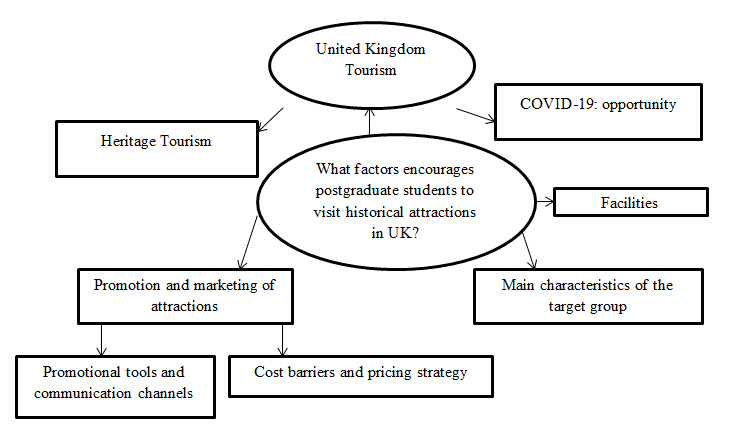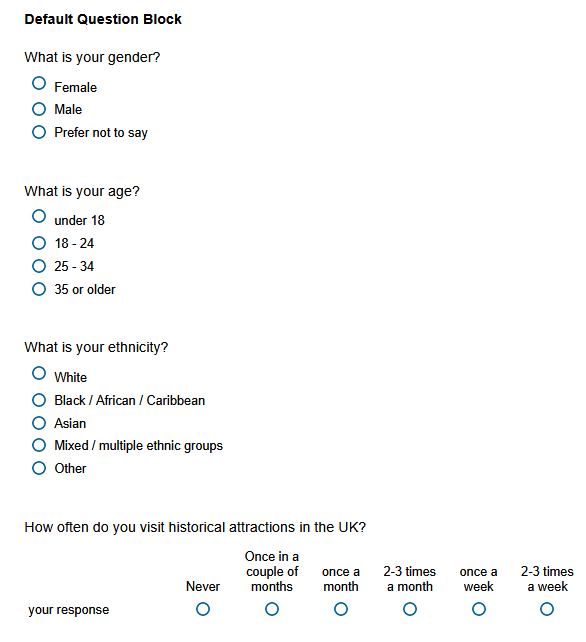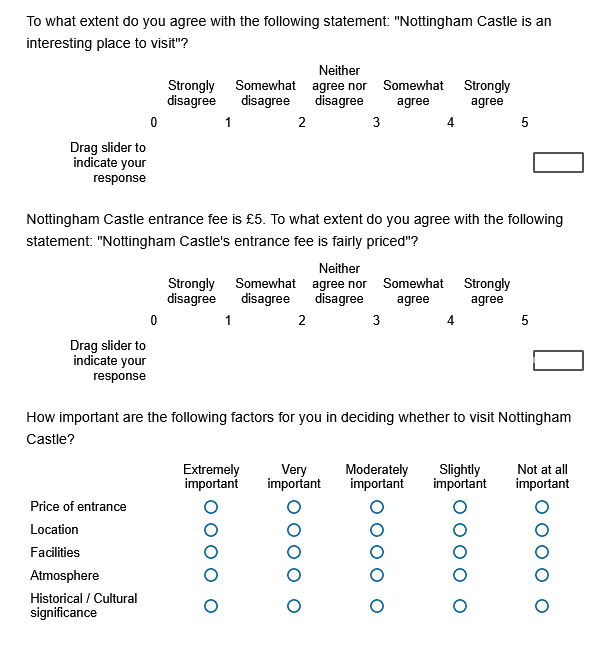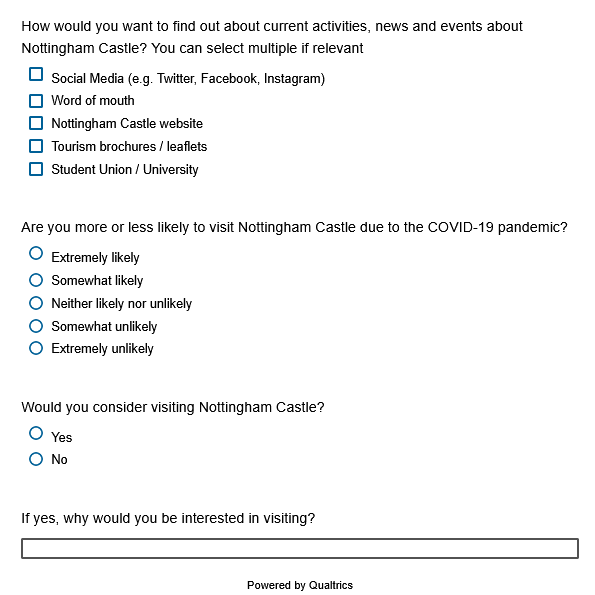Background and Rationale
The United Kingdom is a union of sovereign states where tourism plays an important role in the economic well-being. Tourism is a significant economic activity within many countries around the globe. With globalization’s advancement, tourism has remained a considerable element of the UK’s economy regardless of the setbacks such as terrorist attacks and the COVID-19 pandemic. The United Kingdom is the tenth-largest tourist destination in the world.
There are many international and local postgraduate students in the UK from various cultures and backgrounds. Visiting different cultural heritage tourist sites in the UK provides them with an opportunity to experience new cultures. One of the most visited cultural tourism site in UK is the Nottingham Tower. There is a myriad of factors apart from the need to experience different cultures that enhance these students’ decision to visit this historical and cultural site. Some of these factors include the marketing and promotional strategies offered by the government, cost constraints, the available facilities, and the postgraduate students’ main intrinsic and extrinsic characteristics.
This study’s main objective will be to identify the main factors influencing the postgraduate students’ decisions to visit the UK cultural heritage centers, with specific emphasis on Nottingham Castle. The study group will be 100 postgraduate students from various UK universities, and they will be selected through stratified random sampling. The study will answer research questions on elements encouraging postgraduate students to visit cultural heritage sites. The proposed period of study will be April, 2021.
Research questions
The research questions for the study will include:
- What are the factors that motivate postgraduate students to tour historic sites in the United Kingdom?
- What is the significance of the identified factors in deciding whether to visit the historical sites?
- How are the participants likely to get information about Nottingham Castle?
- Is the Covid-19 pandemic likely to affect visiting the historical sites, mainly, Nottingham Castle?
Literature Review
Nottingham Castle was originally a seventeenth Century Mansion built by William Cavendish, Duke of Newcastle. It was opened as a municipal museum in 1878. Located at the top of a hill in a large park close to the city Centre, the museum houses an art collection of approximately 5,800 contemporary and historical works of art and collections of decorative art and archaeology (Hooper-Greenhill, 2001. p. 2). A visit to Nottingham Castle promises a day-filled historical revelation on British history. Nottingham Castle is currently closed following a £30m restoration project that has been running since the summer of 2018. The reopening date for the Nottingham Castle is still unknown.
Postgraduate students visit this castle for both recreational activities and study purposes. Students who are learning about culture and heritage, and art visit this place to have a first-hand experience of both fine arts and contemporary arts displayed in the Nottingham Castle Museum & Art Gallery and interact with Nottingham’s artistic community. Most of the postgraduate learners visit Nottingham Castle to have fun. Some of the fun activities include relieving Robin Hood adventures, underground castle caves, Mortimer’s hole, a tour around the castle, and daily highlight art tours (Nottingham Castle, 2021, para. 1). The learners can visit these places individually or in groups.
The COVID-19 has negatively influenced the UK’s tourism sector in 2020 and 2021, with the government restrictions both in the UK and globally. Despite the restrictions affecting various sectors of the economies they have been implemented to enhance the safety of the people. Restriction on international movement has, however, increased the possibility domestic tourism within the country. The impacts have been felt throughout the nation and tourism allied sectors (Office for National Statistics, 2021, para. 2). With the pandemic and the castle’s closure, the postgraduate students have been unable to visit Nottingham Castle and experience its wonders (Towers and Towers, 2020, p. 1145). Many of them have been able to have virtual tours on heritage and culture through YouTube and other virtual media platforms. Although virtual tours to these heritage sites may provide a feel of the cultures, physical visits are more fun. These videos may also build anticipation motivating the students to make plans of visiting Nottingham palace once it is open to the public.
The frequency in which UK postgraduate students visit Nottingham Castle can be understood through the theory of planned behavior (TPB). This theory postulates that the individual’s intentions to perform a behavior are the core motivational factor in influencing the specific behavior. These behaviors are influenced by beliefs that are very subjective on the expected outcomes (Gbadamosi, 2017, p. 16). These attitudes are also formed by evaluating the expected results; this evaluation can be achieved through proper marketing and choices. Subjective norms can also influence beliefs which may control or promote the behavior or opinions according to the specific group of people. Perceived behavioral control is influenced by factors that may encourage or impede performance such as skills, resources, and opportunities (Lucarelli et al., 2020, p. 8). These attitudes and beliefs influence how postgraduate students visit Nottingham Castle.
Conceptual Framework
This conceptual framework aims to classify and analyze different factors available for study to identify an existing gap. It enables a researcher to describe the research idea, map the research terrain, systematize relationships among notions and find research gaps in the study (Lucarelli, Mazzoli and Severini, 2020, p. 6). In this research, factors such as the UK tourism landscape, the target group, tourism facilities, and the promotion and marketing of these tourist sites will be considered independent variables. The dependent variable is the visitation of Nottingham Castle. The UK postgraduate students’ visit to the cultural heritage tourist sites majorly depends on the mentioned independent variables.

Research Methodology
This research study aims on finding out the factors which encourage postgraduate students to tour historical sites in the UK; the main focus is on Nottingham Castle. Ontology is classified in reference to objectivism and subjectivism and it focuses on reality. The attitudes of the students on visiting the historical sites will be mapped based on subjectivism philosophy. The students must understand that the site they are yet to visit is inhabited by human beings who have their thoughts, interpretation, and different opinion on different aspects of life. Data will be collected on students who frequently visit these sites. The group was chosen based on the assumption that there are varied factors encouraging the students to tour the sites. Epistemology is about positivism and it involves accepting knowledge about a certain research area. The students must put aside their thoughts to whatever they intend to study and research on. The things that the students consider they have knowledge about might affect the objective of the study; therefore, they must take a neutral stand prior to the study.
Research Strategy and Design
The research study will be conducted to determine the factors that encourage postgraduate students to tour historical sites in the UK. This section will discuss the research design, research strategy, data collection methods, and why the study will focus on a particular sample size. Also, the vital equipment and tools will be discussed in detail. The sampling methods, sampling design, and the data analysis methods used in the research will be discussed in length. The study will adopt the mixed-methods descriptive survey design. The importance of using the descriptive mixed-method design in the study is to combine both the qualitative and quantitative results so that the survey results are strengthened.
Data Collection
An online questionnaire that includes both closed-ended and open-ended questions will be used. The questionnaire will be created based on the significant issues identified in the literature related to postgraduate visits to the historical sites. The questionnaire will be divided into four sections:
- Demographic information.
- Students’ experience in visiting the historical sites.
- Factors that encourage the students to see Nottingham Castle.
- Open-ended questions for the participants to explain their experiences in visiting Nottingham Castle.
Validity of the Questionnaires
The validity of the used questionnaires will be conducted through pilot test. The pilot study will be done using 30 students who will not participate in the survey. The questionnaires will then be created in an online format. The participants’ information and the link to the questionnaire will be sent to their emails using their specific University email systems.
Participants
The target group is 200 postgraduate students studying in the UK. The students will be sampled from different institutions in Britain. Primary data will be obtained from the postgraduate students interested in visiting the historical sites. The universities across the UK will be selected randomly using a stratified sampling method. Before the survey, the participants were first consulted and asked to sign consent before they were assured of confidentiality.
Data Analysis
The quantitative data will be analyzed using frequency tests so that the demography of the participants is determined. The percentages and frequencies for the obtained variables will be computed, and then the SPSS tool used to analyze data (Kelso and Giddy, 2018, para. 5). Analysis of the demographic section will be done using the descriptive analysis technique. The results will then be presented in bar graphs to determine how different factors affect the students’ decisions to visit the historical sites.
Reflective Piece
The use of the descriptive research design in this survey is significant in guaranteeing excellent project work. This is achievable by collecting primary data by issuing questionnaires to the target group in the United Kingdom. Seriously emphasizing the factors that motivate the students to visit the historical sites is vital. The students consider several factors in choosing whether to tour the historical sites or not. Some of these factors include the sites’ location, the available facilities, pricing strategy at the sites, government regulations due to the spread of covid-19, and the cultural significance. All the necessary information can only be acquired by properly reaching the target group for actual and effectual data for the survey. The use of quantitative and qualitative data in the descriptive survey design is crucial in acquiring information on the factors which encourage the students to tour the sites. The obtained data can be elaborated on before conclusions are drawn.
Several postgraduates have opted for social media instead of physically visiting the historical sites, as evident from the literature review. Many people fear acquiring Coronavirus; thus, the spread of the COVID-19 pandemic has greatly affected their decisions on visiting the sites. The government has set up strict regulations such as lockdown that have to be obeyed. Therefore, most tourists prefer accessing the news and events at Nottingham Castle through social media, promotional brochures, and websites. Several students like getting information about Nottingham Castle from social media and other platforms. This is to avoid numerous unnecessary movements during the pandemic because of the cessation.
Limitations of the Study
The use of open-ended questions may result in an ambiguous data which may not be easy to analyze. The participants may give a general view of the factors affecting their visits, thus leading to inappropriate answers. Furthermore, the low response rate for the online survey is another severe limitation for the study. The chosen sample size is small, thus making it quite difficult to generalize the survey results. Besides, participants do not always take questionnaires seriously; therefore, mainly relying on their answers is evidence that wrong answers are not likely to be controlled. In accurate data may be detrimental to the reliability of the research since it may result in wrong conclusions which are statistically proven.
Recommendations
The survey recommends that Nottingham creates activities that will encourage the postgraduate students to visit the site. Most of university students are still young; they prefer involving in activities that are enjoyable and exiting. Thus, the costs for visiting the sites should be slightly moderated so that several students can afford them. To decrease the number of Coronavirus infections in the UK, tourists should be encouraged to use social media platforms to get more information about the historical sites instead of physically visiting the sites. Furthermore, the University management should motivate the student to recognize the need to visit the historical sites in their daily activities to acquire new experiences. Domestic tourism is an important aspect since it enables people to understand their country better.
Reference List
Gbadamosi, A. (2017) Young consumer behaviour: A research comzzanion. Routledge: London.
Hooper-Greenhill, E. and Moussouri, T. (2001) Visitors’ interpretive strategies at Nottingham Castle Museum and art gallery (No. 2). Research Centre for Museums and Galleries and University of Leicester
Kelso, C. and Giddy, J. (2018) ‘Insight into nature-based experiences and perceptions of conservation: postgraduate students’ visit to a South African national park’, South African Geographers, 1(1), p.783.
Lucarelli, C. Mazzoli, C. and Severini, S. (2020) ‘Applying the theory of planned behavior to examine pro-environmental behavior: the moderating effect of COVID-19 beliefs. Sustainability, 12(24), p.1-17
Nottingham Castle (2021). Web.
Office for National Statistics (2021) Coronavirus and the impact on the UK travel and tourism industry – Office for National Statistics. Web.
Towers, A. and Towers, N. (2020) ‘Re-evaluating the postgraduate students’ course selection decision making process in the digital era’, Studies in Higher Education, 45(6), pp. 1133-1148
Appendices


